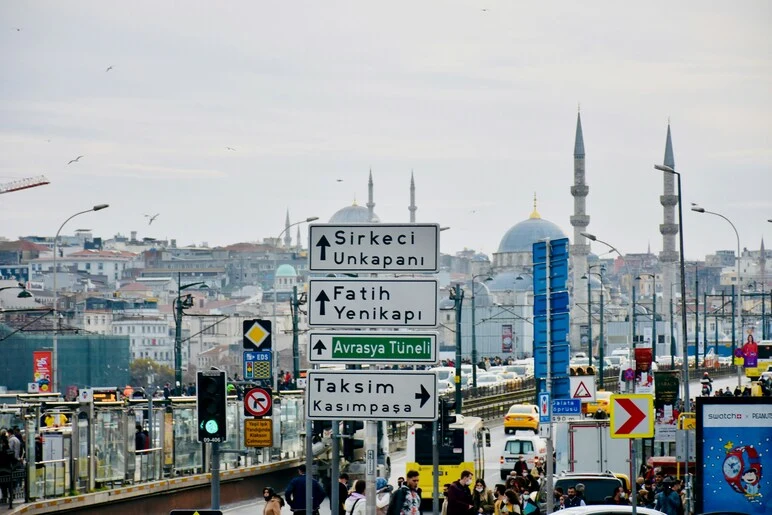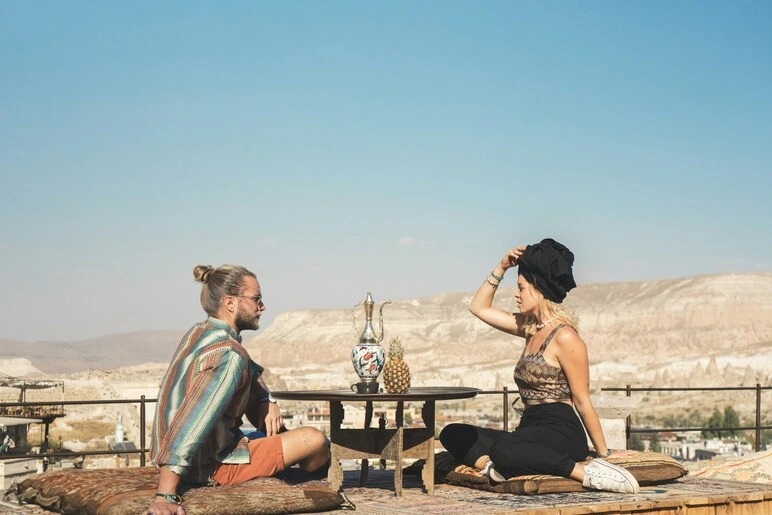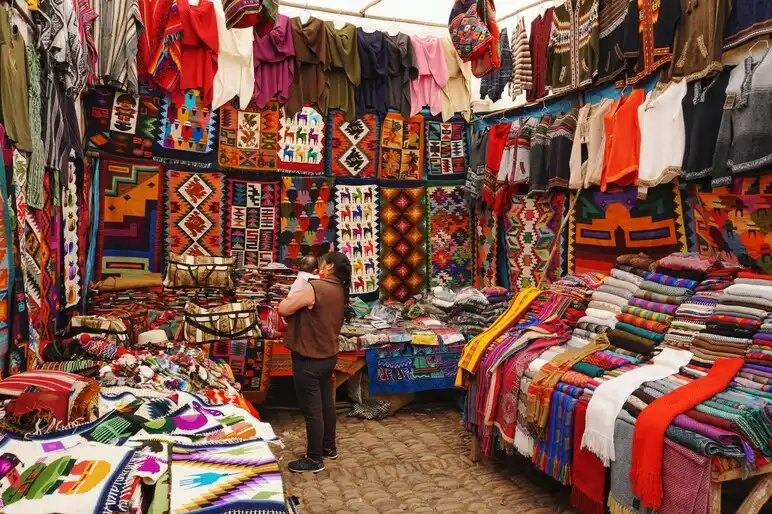
Turkey (Türkiye) is so much more than a country—it’s a captivating mosaic of cultures, contrasts, and centuries-old charm. This destination seamlessly blends tradition with modern flair, evident through its ancient ruins, magnetic cities, turquoise coastlines, and sun-drenched bazaars.
Every corner of Türkiye offers a fresh adventure with timeless elegance.
Fret not! Keep scrolling down to read this edition of our Turkey guide.
Tips for fully immersing yourself in Turkey
There are general variables to keep in mind when you’re travelling to Turkey. You don’t want to experience some sort of disaster, right?
Currency and spending tips
The local currency is the Turkish Lira (TRY), and while some places may accept Euros or USD, it’s always smarter (and cheaper) to pay in Lira. Credit cards are widely accepted in urban areas, but keep some cash on hand for bazaars, public transport, or quaint villages where card readers are rare.
ATMs are plentiful—even in remote areas—but beware of high transaction fees, especially at the airport. If you're withdrawing cash, opt for machines attached to major banks and decline dynamic currency conversion for the best rate.
How safe is Turkey?

Turkey is a generally safe and welcoming destination. Basic travel smarts apply: stay alert in crowded places, keep valuables close, and avoid flashing expensive gadgets or jewellery.
Tap water is safe in cities, but many prefer bottled water due to its strong taste. As for food? Dive in! Local street food—from juicy kebabs to roadside strawberries—is often better than overpriced tourist restaurants near major landmarks like Sultanahmet. Trust your instincts (and your nose), and you’ll eat like royalty.
Just a quick word of caution: Always travel with insurance that covers both health issues and unexpected hiccups—just in case.
Remember these Turkish phrases to win smiles
Google Translate is always available, but knowing these basic Turkish phrases goes a long way. Here are some to keep in your back pocket:
- Merhaba – Hello
- Teşekkür ederim – Thank you
- Lütfen – Please
- Hesap lütfen – The check, please
- Ne kadar? – How much?
- Afedersiniz – Excuse me / Sorry
- Nerede? – Where? (e.g., Tuvalet nerede?)
- Bakar mısınız? – Can I get your attention?
- Yardım eder misiniz? – Can you help me?
- İngilizce biliyor musunuz? – Do you speak English?
- Üzgünüm, Türkçe bilmiyorum – Sorry, I don’t speak Turkish
Stay connected with SIM cards
Mobile data is essential for Google Maps, Translate, or rideshare apps. You can grab a SIM from Turkcell, Vodafone, or Türk Telekom—all reliable providers. Just bring your passport for registration (required by law), and you’ll be connected in minutes.
Need help finding a store? Ask your hotel concierge or head to busy areas like Taksim Square or Sultanahmet, where SIM shops are plentiful.
What to wear in Turkey?

Turkey’s fashion landscape is as diverse as its geography. While it's a secular country with a Muslim majority, you’ll find everything from full hijabs to beachwear depending on where you are. In cosmopolitan cities like Istanbul or coastal resorts like Bodrum, sleeveless tops, shorts, and dresses are perfectly acceptable. In fact, you’ll see locals and visitors alike mixing contemporary style with cultural flair.
That said, when visiting mosques, such as the Hagia Sophia, dress codes apply. Shoulders, knees, and (for women) hair should be covered. Don’t worry, though—scarves are sold in every market, and many mosques offer them at the entrance. And yes, shoes must come off before stepping into sacred spaces, so slip-ons are your friend.
Steering clear of scams
Scams, like in any popular travel destination, can occasionally catch tourists off guard in Turkey — but with a touch of street smarts and a dash of awareness, they’re easily sidestepped. Think of it as part of the travel game: stay sharp, trust your instincts, and you’ll navigate like a seasoned pro.
Here are some common scams and tips for sidestepping them:
“Friendly Local” scam
A kind stranger invites you for tea, then the bill hits hard. Politely decline uninvited offers.
Taxi tricks
Insist on using the metre or opt for BiTaksi or Uber.
Shoe shine offers
A dropped brush leads to an unwanted polish and a fee. Just keep walking.
Tourist menus without prices
Always ask to see a full menu before ordering.
Pickpocketing
Stay alert in crowded areas. Use crossbody bags and keep them zipped in front as an option.
What to buy (and what to avoid) in Turkey?

Shopping in Turkey might be puzzling to some due to its buzzing, sensory, and a tad bit theatrical ambience. Think bold colours, the scent of spices wafting through the air, shopkeepers calling out deals, and the fun of haggling over beautiful handcrafted goods.
Turkey’s markets are an experience at the historic Grand Bazaar in Istanbul and neighbourhood souks and open-air stalls. Here’s what you really need to keep in mind before diving into a Turkish market or boutique:
Cash is king. While cards are accepted in many places, smaller shops and market vendors often prefer cash. Turkish Lira is your best bet for good prices.
Be careful with “genuine” goods. Not all “handmade” or “authentic” items are what they claim to be. If it seems too cheap, it probably isn’t the real deal.
The walk-away power works. If you're not sure, walk away politely. Often, the seller will come back with a better offer.
Language barrier? Smile and gesture. Many vendors speak some English, especially in tourist areas. But even when they don’t, a smile and a calculator go a long way.
Check multiple shops before buying. Prices can vary wildly for similar items—comparison shopping is key.
The variety of Turkish goods is incredible. Each region has its specialities, like hand woven carpets in Cappadocia or olive oil soaps in the Aegean. However, haggling is expected, especially in bazaars and touristy markets. Don’t be shy—start at 50 per cent of the asking price and work your way up. Stay polite, smile often, and don’t be afraid to walk away. Vendors respect confident, friendly negotiators. It’s a dance, not a fight.
Include these on your shopping list:
Go loose-leaf and aromatic. You can head to the Spice Bazaar for your spices and teas.
Sample Turkish delight and sweets before you buy. The good stuff is fresh, chewy, and not overly sweet.
Turkish fabrics are famously rich in texture and colour. They're found in scarves, kilim rugs, and other textiles. The Grand Bazaar is heaven for high-quality, handmade finds.
Ask for an authenticity certificate. This is in the case of making a big purchase.
Hand-painted Iznik tiles and mosaic lamps make beautiful souvenirs. Each piece is a work of art. Look for slight imperfections—they’re the mark of true craftsmanship.
Leather goods are high-quality and often custom-made. However, beware of fakes claiming designer brands.
Buy from Kuru Kahveci Mehmet Efendi. This is for the real deal of Turkish coffee.
Meanwhile, mass-produced souvenirs near tourist hotspots, fake designer goods, and shops that insist on showing you “just one more thing” should be avoided at all costs.
When is the best time to visit Turkey?
Turkey’s climate is as varied as its landscapes. Spring (April–May) and fall (September–October) are ideal for travel, offering cooler temperatures, thinner crowds, and a touch of seasonal magic. Istanbul and Cappadocia may require light layers during these months, while the southern coast—think Kaş, Antalya, and Bodrum—still calls for swimsuits and sandals.
Avoid peak season (June–August) if you dislike crowds and/or sweltering heat. But if you’re after beach parties and sun-soaked days, summer is your scene.




 Mirella Pandjaitan
Mirella Pandjaitan
 Jun 12, 2025
Jun 12, 2025